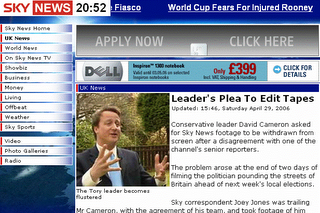When do governments reach a tipping point? That moment when it all simultaneously implodes, slumps, disintegrates, splinters and collapses. Today's news could scarcely be any worse for Tony Blair:
- Charles Clarke is in serious trouble because of the foreign prisoners’ deportation debacle;
- Patricia Hewitt opens herself up to ridicule for claiming the NHS is experiencing its "best ever year", which doubtless provoked today’s heckling by health workers; and
- John Prescott occupies the front page of the Daily Mirror with lusty tales that will bring a blush of anger to the cheeks of Pauline.
Until now, I’ve felt Mr Blair was an asset to the Labour Party, in spite of everything: he has been, without doubt, the most talented politician of his generation. A gifted communicator. An exceptional strategist. A political zeitgeist.
Of course, it all went wrong with Iraq: that is his legacy, and I think he now accepts that the catastrophically mistaken decision to invade on a false prospectus and without UN authorisation is what he will be remembered for. It is a tragic testament to the Prime Minister’s doomed talents.
But in the last few weeks, there’s been something indefinably stale in the air, sour to the taste, prickly to the touch. The ‘cash for peerages’ row was the start. It was not so much that what Mr Blair (or those who act in his name) has done is wrong or illegal - though it may turn out to be both - but that he just didn’t seem to care, couldn’t see what all the fuss was about, was exasperated by the need to explain such piddling facts of life to the press or public.
He shrugged his shoulders, stuck up two fingers, and turned his back on the problem. The political funding laws, he said, needed tightening; neglecting to note that they needed tightening because he couldn’t be trusted to observe their spirit, let alone their letter.
Today's performance at Prime Minister's Questions in defence of Charles Clarke was one of Mr Blair's weakest to date. He looked beleaguered and bewildered, defending Mr Clarke not because he felt he should, but because it was a virility test he must pass. And yet when it was his Home Secretary 's turn to explain his department's muddles to the House of Commons, Mr Blair deserted him. Giving out mixed signals is not what the old Tony Blair would have done.
(Here, by the way, is what Mr Clarke should have done: announced he would quit in two months' time, once he had done all he could to institute reforms in the Home Office. Imagine the statement:
"I accept personal responsibility for what happened on my watch as Home Secretary. This was a huge cock-up, and it is only right that the buck should stop with me. But it would be deeply irresponsible to leave the department immediately. I am setting myself two months to oversee the reforms which are necessary, so I can ensure my successor can hit the ground running. I will then retire to the back-benches knowing I have acted with honour, and left no-one in the lurch."
That would have rescued his reputation, and boosted his popularity. Oh, and been the right thing to do.)
That New Labour should be vulnerable to attack on the NHS would once have been unthinkable. Almost everyone recognises the health service has had a massive cash injection, that it is - for the first time in a generation - well-funded. Yet still there are huge deficits threatening hospital closures and likely job losses. Unsurprisingly the public concludes their money is being wasted.
The Prime Minister is right to point out that it is the Government's reforms which have brought this to light; that this waste is not new, but that health managers are now accountable for it. The old Mr Blair would have won that argument. (The old Mr Blair would also have had the sense not to put Patricia Hewitt - perhaps the least empathetic, most patronising minister in the cabinet - in such a sensitive role.)
The last two days' polls have suggested support for New Labour is crumbling: it is hovering at 30%, a figure not seen since the days when Neil Kinnock and Margaret Thatcher were slugging it out across the despatch box. Doubtless to the distress of many Conservatives, it is not Mr Cameron's shiny new Tory Party which seems to be benefiting, but the Liberal Democrats, up to 24-25%, unthinkable even two months ago.
The Tories are still coming to terms with quite how damaged their brand is. I have noted before that there is a certain symmetry between the optimism with which Michael Howard's ascension as Tory leader was greeted, and the paroxysms of ecstasy which Mr Cameron's election has induced.
Two years ago, the Tory Party was riding high in the polls, fully expecting triumphant local and European election results. Then something happened: they were out-flanked. Mr Blair pledged a referendum on the European constitution - a central plank of the Tories' election campaigns - and Ukip mopped up the "gadfly, fruitcake and closet racist" vote. Mr Howard never recovered.
How will Mr Cameron react to his Party's failure to make progress against a Government whose unpopularity must now trough alongside John Major's abysmal efforts in the mid-1990s? Will he continue to stick determinedly to a middle course which appears to be attracting few floating voters, but atrophying his base; or will he revert to type, and seek to plough the lonely right-wing rut his predecessors perfected?
Mr Blair is now finished, of that I am certain. He may limp along for months, perhaps years - after all, John Major held out long enough - but he is damaged beyond repair. His staying can no longer serve any useful purpose, either for his Party or the country. He is tired. He deserves a rest. And so do we.



